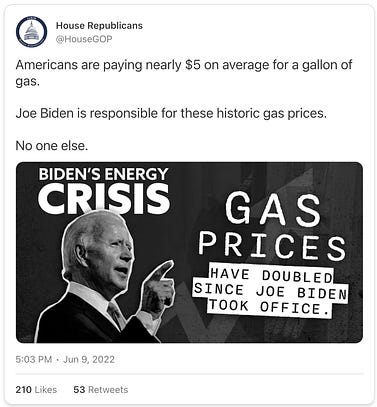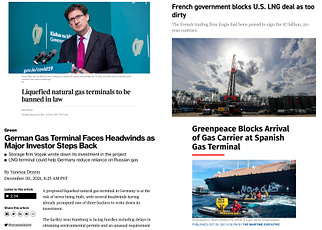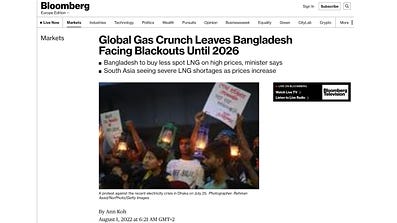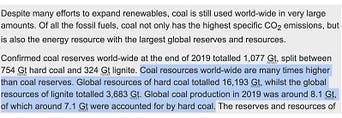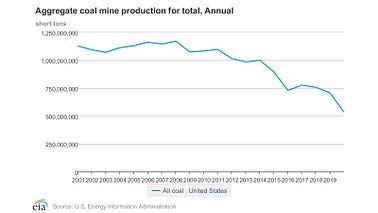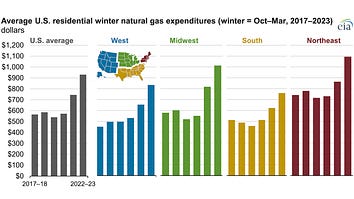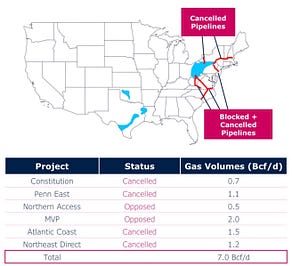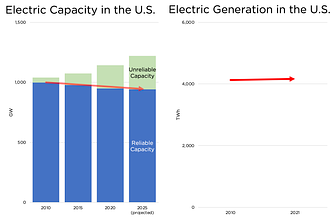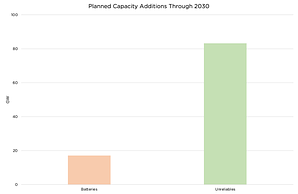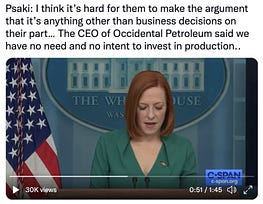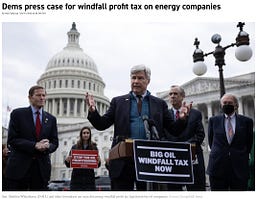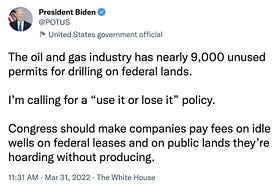| It is crucial to have powerful criticisms of President Biden's terrible energy policies, as they are an existential threat to our country. However, it is also crucial that this not be pursued by inaccurate, easy-to-refute claims that serve to undercut accurate criticisms. For example, this House Republicans Tweet is inaccurate. It is not accurate to say "Joe Biden is responsible for these historic gas prices. No one else." Clearly pre-Biden policies and other global factors are major influences on gasoline prices. Oversimplifying the issue this way leaves one vulnerable to the obvious counterargument that "The price of oil is determined by global supply and demand, Joe Biden himself can't control it." After hearing this counterargument, many will conclude "People are just picking on Biden but it's not really his fault." But gasoline prices—and the many other elements of the global energy crisis—are substantially Biden's fault—above all because he's a longtime leader of the root cause of today's energy crisis: the global anti-fossil-fuel movement. 1: Properly identify the root cause of the global energy crisis as the global anti-fossil-fuel movement—with Biden as a longtime leader. 2: Hold Biden and other anti-fossil-fuel politicians accountable for squandering the opportunity make America a far more prolific energy producer—by failing to liberate American energy. 3: Refute the various denial tactics the anti-fossil-fuel movement uses to absolve itself of responsibility for today's energy crisis.
If not for global anti-oil policies, Russia's Ukraine invasion and the subsequent embargoes would be much less consequential. Indeed, they would have been an opportunity for US producers to grow their market shares, as they did in the recent past when breaking the OPEC+ cartel. The "climate emergency" movement is trying to deny all responsibility for today's energy emergency. They blame the emergency on Russia's invasion of Ukraine—which is a secondary factor. Or, they chastise the fossil fuel industry for not meeting demand—which is absurd and unjust. Today's high fossil fuel prices are not primarily a "Putin price hike." They are caused by global anti-fossil-fuel "climate emergency" policies—which made fossil fuel prices artificially high before Putin's war and prevented the free world from quickly increasing production in response. The "climate emergency" movement has the gall to chastise the fossil fuel industry for not sufficiently ramping up production post-pandemic and post-Putin-invasion. But this insufficient ramp-up is the result of anti-fossil-fuel policies that restrict and punish new attempted production!
The cause of Europe's energy insecurity, which has rendered it impotent against Putin, is simple: When you restrict domestic fossil fuel production on the false promise of replacement by unreliable solar and wind, you become dangerously dependent on foreign production. Europe's vulnerability to Russia was completely preventable. Europe and its allies have all the natural gas, coal, and uranium they need to produce low-cost, reliable heat and electricity for generations to come. But anti-fossil fuel, anti-nuclear policies have neutered Europe. For the last 2 decades Europe has destroyed its ability to produce and import energy from fossil fuels and nuclear—on the promise that unreliable solar and wind could replace them. But after trillions in subsidies, it's clear that they have failed. One major cause of Europe's current energy impotence is its numerous bans on the greatest natural gas producing technology ever invented: fracking. Fracking has been banned by France, Bulgaria, The Netherlands, Germany, Spain, and the UK. Another major cause of Europe's current energy impotence is its opposition to LNG (Liquefied Natural Gas) import terminals—combined with the US's opposition to export terminals. If not for these, Europe could get a lot of its gas from America—not Russia.
The world is experiencing the worst energy crisis since the 1970s, and it may end up being far worse.
Skyrocketing energy prices are driving price inflation in every area of life. Even in wealthy Europe we are seeing mass-hardship, deindustrialization, and fear of winter.
While America is suffering from the energy crisis and Europe is suffering far more, the worst-affected are poor nations—who are getting outbid for today's scarce energy supplies. For example, we've seen power outages in Bangladesh, which has been outbid for natural gas by Europe.
The global energy crisis constitutes an emergency—a dire and deadly problem requiring a swift, dramatic solution.
What's the solution to the global energy emergency?
We must put a stop to its cause: the "climate emergency" movement's campaign to rapidly eliminate fossil fuels. While "climate change"—humans impacting climate—is real, "climate emergency" is not. The world is slowly becoming warmer—at a cold point in geological history, when many more people die of cold than of heat. This doesn't at all justify rapidly restricting global fossil fuel use. The "climate emergency" movement, centered in the West, has restricted
1. fossil fuel investment
2. fossil fuel production
3. fossil fuel transport
This has artificially suppressed fossil fuel supply, making industry unable to meet growing demand. Which means sky-high prices. Today's high fossil fuel prices are not primarily a "Putin price hike."
They are caused by global anti-fossil-fuel "climate emergency" policies—which made fossil fuel prices artificially high before Putin's war and prevented the free world from quickly increasing production in response. The "climate emergency" movement has the gall to chastise the fossil fuel industry for not sufficiently ramping up production post-pandemic and post-Putin-invasion. But this insufficient ramp-up is the result of anti-fossil-fuel policies that restrict and punish new attempted production!
Skyrocketing natural gas and coal prices are not a failure of the fossil fuel industry, but the total failure of anti-fossil fuel policies, which falsely promised that if we dramatically restricted fossil fuel energy production, green energy could easily replace it. There is no physical reason that the natural gas and coal industries can't meet rising demand. The world has hundreds of years' worth of gas deposits and thousands of years worth of coal deposits. But governments radically restrict the freedom to utilize those deposits.
There is no technical or economic reason the natural gas and coal industries can't meet demand. These industries have gotten radically more capable and efficient in the last two decades--especially natural gas with fracking. But governments radically restrict their freedom. In Europe, fracking and other shale gas technologies could produce a lot of gas, but Europeans have over and over chosen to ban fracking--reassuring citizens that solar and wind would provide all the energy they need. How is that going? America has been called "the Saudi Arabia of coal." At today's prices, America's coal industry would love to be powering the world. But it can't because of onerous restrictions on coal transport, as well as myriad domestic restrictions on desperately-needed coal production.
America is experiencing our worst energy crisis since the 1970s. High oil prices are making driving expensive, while high natural gas prices are making heating and electricity far more expensive—above all in the Northeast, where some ratepayers might see prices more than two times last winter's.
Democrats could have ensured far lower oil and gas prices despite global tumult had they, upon taking power in 2019:
1) Liberated oil investment, production, and transport.
2) Liberated natural gas investment, production, and transport.
Instead, they systematically strangled oil and gas. Is it any wonder that, threatened incessantly by US Democrats and other anti-oil forces, global investment in oil declined dramatically despite growing long-term demand? Between 2011 and 2021, oil/gas exploration investments declined 50%.
Less investment = less supply = higher prices. Our bountiful natural gas is only useful if it can be transported by pipeline—to where it is needed in the US and to export terminals for shipment abroad. But in recent years we have seen a Democrat-led movement to block pipeline after pipeline—such as these 6 pipelines.
Skyrocketing oil and gasoline prices are not a failure of the oil industry. They are the total failure of anti-oil politicians, who have artificially restricted the supply of oil with massive restrictions and threats to oil production and transport. Contrary to rhetoric by Elizabeth Warren and others, oil and gasoline prices are not rising "because giant oil companies like Chevron and ExxonMobil enjoy doubling their profits." If oil companies could control prices they would have done so during often-unprofitable 2015-2020. There is no physical reason the oil industry can't meet rising demand. The world has hundreds of years' worth of oil deposits. There is no technical reason the oil industry can't meet rising demand. It is more capable than ever thanks to amazing technologies like fracking. Perhaps the greatest limiter of the supply of oil has been anti-oil politicians' constant threats to severely restrict or even ban oil production going forward. E.g., when Joe Biden promises "I will end fossil fuel" and then becomes President, oil investors run for the hills. The cause-and-effect of unnecessarily high oil prices is simple:
1. Anti-oil politicians around the world artificially restricted the supply of oil with massive restrictions/threats.
2. These restrictions prevented supply from keeping up with demand, and prices went way up.
America's grid is in decline and about to get far worse due to policies that 1) reward unreliable electricity, 2) prematurely shut down coal plants, 3) criminalize nuclear, and 4) force electric vehicle use. The root cause of our grid's reliability problems is simple: America is shutting down too many reliable power plants—plants that can be controlled to produce electricity when needed in the exact quantity needed. And it is attempting to replace them with unreliable solar and wind. Nationally, as demand has increased over the last 10 years we have seen a decline in reliable capacity (gas, coal, oil, nuclear, hydro, battery storage) by 5%.
Will batteries make unreliable solar/wind reliable? No. Battery storage is expensive and can only provide a given "capacity" (e.g., 1 GW) for a few hours, and only then if fully charged. Planned batteries are nowhere near enough to compensate for solar and wind's unreliability.
Grid-destroying policy: coercing electric vehicle use At a time when reliable electricity is scarce and about to become far scarcer, the Federal government and certain state governments are trying to force us to use electric vehicles—which would lead to major increases in electricity use at certain times of day.
For 15+ years Democratic politicians, including Joe Biden, have relentlessly attacked oil investment, oil production, and oil transport—leading to higher prices and lower security.
Instead of taking credit for their "success," they are denying that they are anti-fossil fuels!
The "business decisions" denial tactic
For 15+ years Democratic politicians have pushed everything they can to threaten new oil production: net-zero, ESG, proposed bans, etc.
Now they are blaming companies for "business decisions" to refrain from threatened oil production!
The "9000 leases" denial tactic
For 15+ years Dem politicians have driven up oil prices by delaying/destroying countless economically viable oil projects.
To deny responsibility they are attacking companies for not developing 9000 leases the companies judge to be economically nonviable.
The energy crisis is simple.
Politicians around the world, including US Democrats, have restricted fossil fuel investment/production/transport on the false promise of replacement by unreliable solar/wind.
The result: higher prices and lower security.
Anti-fossil fuel politicians, please stop the denial.
Share
"Energy Talking Points by Alex Epstein" is my free Substack newsletter designed to give as many people as possible access to concise, powerful, well-referenced talking points on the latest energy, environmental, and climate issues from a pro-human, pro-energy perspective. Share Energy Talking Points by Alex Epstein | |



